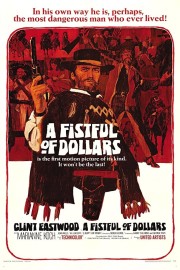A Fistful of Dollars
Inspired by “Rango,” I decided it was time to revisit all three of Sergio Leone’s classic Spaghetti Westerns with Clint Eastwood. Starting with the painterly opening credits and Ennio Morricone’s howling theme, this first film in Leone’s “The Man With No Name” trilogy immediately sets itself off from the likes of John Ford’s classic films with an unusual sound and visual style. This isn’t America’s Old West; this is something new.
And Eastwood’s “Man With No Name,” who is called Joe later in the film, was a new type of hero. He wasn’t a noble lawman or soldier like many of John Wayne’s characters but a sullen and mysterious desparado who wasn’t motivated by love or honor but money. He rides into the dusty town of San Miguel, which is run by two gangs: the Baxters, four of whom Eastwood dispatches immediately upon his arrival after they shoot at him and his horse, and the Rojos and their ruthless leader Ramon (John Wels). With his lone “friend” the old saloon owner, Eastwood has the idea of hiring himself out as a gunslinger to the highest bidder, which turns out to be…both gangs.
If the plot sounds familiar, it’s because not only was it “borrowed” by Walter Hill for his 1996 film “Last Man Standing,” but because Leone himself borrowed it from the great Akira Kurosawa, who created his own “Man With No Name” in 1961’s “Yojimbo” and 1962’s “Sanjuro.” Having seen both “Yojimbo” and “Fistful,” the similarities border on out-and-out theft. But Leone has his own ideas on how to bring this story to life. The Spanish vistas that provide the backdrop for this film are more menacing than Ford’s Western home of Monument Valley, and the characters are bad to the bone; Baxter is actually the sheriff of the town (or he claims to be at least), and the faces of these characters are just as unseemly as their behavior.
Eastwood fits in perfectly with this universe. Never a matinee idol even in his youth, Eastwood’s weathered face and gruff voice is ideal for this world. What his character does in this film is generally not out of a sense of right and wrong but the best way to profit for him. It’s about causing trouble in a town where trouble is easy to cause; his exchanges with the coffin-maker in that first scene is wickedly funny in its terse cynicism. Eastwood’s character maintains that note throughout the entire film, making it none too surprising he became a star after its success.
As for the film itself, it’s a great little Western. What it lacks in Hollywood production values it makes up for in a gritty, lived-in style– punched up by Morricone’s operatic score –that gives the film a feel all its own. It’s not a great masterpiece (though it did pave the way for one) but it is an entertaining film unlike any audiences had seen before, although Leone and others would make sure we saw plenty more like it after.










